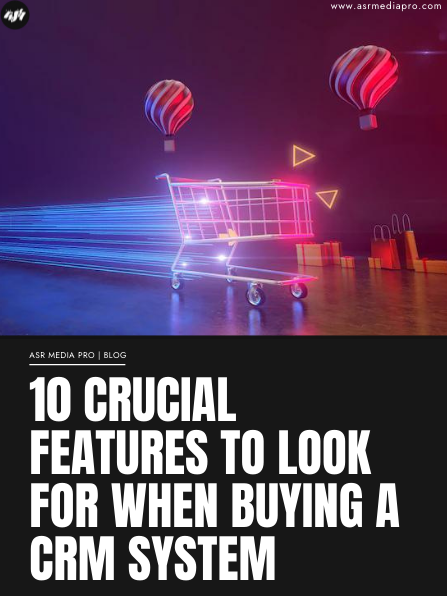
10 Crucial Features to Look for When Buying a CRM System
10 Crucial Features to Look for When Buying a CRM System As you might expect, leading CRM solutions provide a vast array of features, from
CRM software can benefit your small business in a variety of ways, from customer retention to increased productivity.
Customer relationship management (CRM) software is used to centralise customer interactions in order to improve the customer experience and satisfaction.
CRM is one of the world’s fastest-growing industries, with a 14 percent compound annual growth rate predicted between 2021 and 2027.
CRM provides numerous benefits, including increased customer retention, increased sales, and detailed analytics.
This article is for small business owners and marketers interested in learning about the benefits of small business CRM software.
CRM software has evolved into a near-essential tool for businesses of all sizes. CRM software can benefit any business in a variety of ways, from contact management to task automation. Additionally, it can serve as a centralised, organised hub that facilitates consistent communication with both customers and internal stakeholders. This is particularly critical as more organisations transition to remote work.
The CRM software market is currently one of the fastest-growing segments of the economy, projected to grow at a 14.27 percent compound annual growth rate from 2020 to 2027, driven by consumer demand for improved customer service, automated engagement, and more nuanced customer experiences.
CRM is an acronym for “customer relationship management,” a type of software that assists businesses in managing, tracking, and organising their customer relationships. A CRM enables you to store customer data such as user behaviour, length of relationship with your business, purchase records, and notes on sales interactions, all of which can be used to optimise your sales and marketing processes and improve customer service across your organisation.
“CRM… is a collection of tools, technology, and techniques that enables sales and marketing professionals to gain a better understanding of their customers,” Bryan Philips, head of marketing at In Motion Marketing, explained.
CRM software works by tracking the behaviour and actions of current and potential customers via your business’s website, social media channels, and email marketing campaigns, and then guiding the customer through the sales or purchasing funnel via triggered emails or alerting a sales representative to the customer’s interest.
The key takeaway is that CRM software is used to store, manage, and organise data about your business’s customer relationships.
A CRM solution can be used in a variety of ways and provides your business with numerous benefits. The following are 11 significant benefits that a CRM may provide.
1. Improving customer service
While modern CRM software performs a variety of functions, its primary purpose was to improve business-customer relationships, and this remains its primary benefit. A CRM centralises all of your contacts and collects critical customer data – such as demographics, purchase records, and previous messages across all channels – and makes it easily accessible to anyone in your organisation who requires it. This ensures that your employees have access to all the information they need about the customer and can provide a more personalised experience, which tends to increase customer satisfaction.
2. Increased sales revenue
A CRM tool can assist you in streamlining your sales process, developing a sales pipeline, automating key tasks, and centrally analysing all of your sales data, potentially increasing sales and productivity. A CRM enables you to create a step-by-step sales process on which your employees can rely and that you can easily tweak as problems arise.
3. Increased client retention
After acquiring and converting leads, it is critical to work to retain them as customers and promote customer loyalty. Customer turnover can have a number of negative consequences for your business, including decreased revenue and disrupted cash flow, so leverage your CRM and the information it provides about your customers to encourage repeat business. The CRM will perform sentiment analysis, automated ticketing, customer support automation, and user behaviour tracking to assist you in identifying and quickly resolving customer service issues.
4. Extensive analytics
It’s one thing to have a wealth of data on your customers; it’s another to understand what that data means and how to use it. CRM software typically includes built-in analytic capabilities that enable data to be contextualised, broken down into actionable items and easily understood metrics. Metrics such as click-through rates, bounce rates, and demographic data enable you to assess and optimise the success of a marketing campaign.
5. Increased efficiency and productivity
CRM software leverages marketing automation technology to automate routine tasks such as drip campaigns, freeing up your employees’ time to focus on tasks that only humans can handle, such as content creation. Additionally, it can ensure that no tasks fall through the cracks (e.g., all important emails are always sent to the right people).
Additionally, a CRM can provide you with a dashboard that illustrates how well your business processes are performing and areas where your workflows could be improved.
6. Centralized information database
Additionally, CRM software excels at centralising all customer information and making it easily accessible to anyone in your organisation who requires it. This enables a sales representative to quickly determine which products a particular customer is interested in, for example. If the customer has interacted with the business previously, the CRM will contain records of that interaction, which can be used to inform future marketing efforts and sales pitches.
This saves your employees time by eliminating the need to dig through old files and records, and it provides the customer with a more positive and productive experience.
7. Assisted in the management of communications with prospective leads
Lead nurturing can be a lengthy and complicated process, with numerous steps and communication opportunities. A CRM automates the process by sending alerts to your employees when they should contact a prospect and tracking all interactions, from emails to phone calls.
“A significant benefit of [CRM] is the ability to view the customer journey holistically,” said Michael Miller, CEO of VPN Online. “With each stage of the design process and each email sent reviewed, you can quickly determine the next step to take. It’s as if you’re seeing it from above, and you can quickly make a decision about what to do next.”
8. Improved segmentation of customers
A contact list of hundreds of names and numbers can become unwieldy and overwhelming. For instance, how do you determine which customers will see your email announcing the launch of a new in-store product? A CRM will segment your contact lists automatically based on your criteria, making it simple to locate the individuals you wish to contact at any given time. You can sort contacts based on their location, gender, age, and buyer stage, among other criteria.
“In fact, automation enables marketers to gain a more meaningful understanding of their customers and to have more valuable interactions when they do interact,” Philips explained. “The critical aspect of automation to grasp is that we do not want to send a generic email to our customers. Rather than that, we want to send emails that reflect our customers’ preferences, interests, and values by segmenting them based on data gleaned from the CRM.”
9. Sales reports that are generated automatically
Your team can easily collect and organise data about prospective and existing customers by utilising the CRM software’s dashboard and reporting capabilities, which enable employees to automate and manage their pipelines and processes. Additionally, the CRM can assist your team members in evaluating their performance, tracking their quotas and goals, and monitoring their progress on individual projects.
10. More precise forecasting of sales
Any business operation requires the ability to evaluate past performance and plan strategically for the future. By utilising automated sales reports included with CRM software, you can identify key trends and get a sense of what to expect from your future sales cycle performance, while also adjusting your goals and metrics to account for those projections.
11. Internal communications streamlined
Apart from facilitating communication between your business and your customers, a CRM can help your employees communicate more effectively with one another. A CRM enables you to see how other employees interact with a potential customer, assisting your team in maintaining a consistent brand voice. Additionally, it enables team members to send notes or alerts to one another, tag one another on projects, and send messages and emails all within the same system.
The bottom line is that CRM benefits include increased sales, detailed analytics, automated sales reports, and improved customer retention.

10 Crucial Features to Look for When Buying a CRM System As you might expect, leading CRM solutions provide a vast array of features, from

7 Ways Telephony and CRM Tools Can Help Your Business Technology has altered how we conduct business. Indeed, technological advancements have improved how companies conduct

This Pixel 4 Can Recognize Life-Changing Diseases Developers from all over the world are attempting to simplify our lives by incorporating numerous new and cutting-edge
